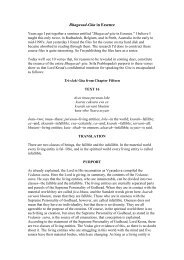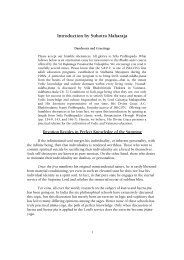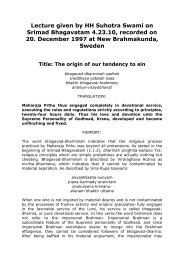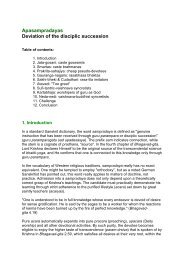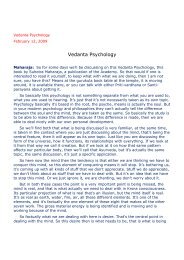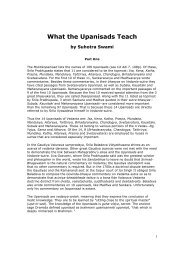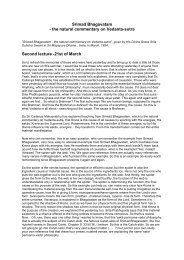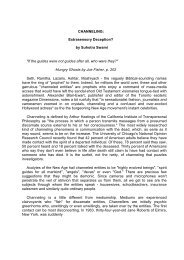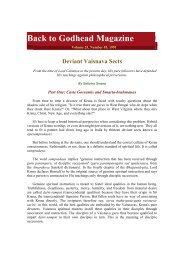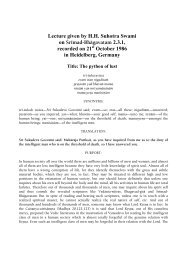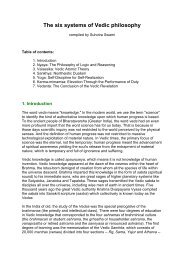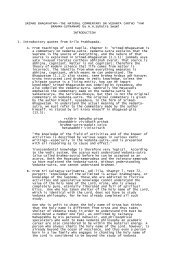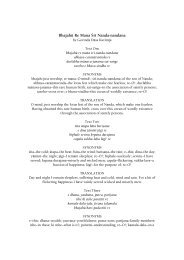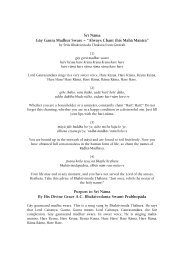Danda 1995 - Suhotra Maharaja Archives
Danda 1995 - Suhotra Maharaja Archives
Danda 1995 - Suhotra Maharaja Archives
- No tags were found...
Create successful ePaper yourself
Turn your PDF publications into a flip-book with our unique Google optimized e-Paper software.
That's they quoted from me.In the chapter you refer to, the authors then said ---1) that I contradict myself by using logic in the above statement because thelogical consequence of that quote is that I should just give up logicaltogether;2) that while stating that I failed to logically devise a framework to resolvethe jiva issue, I suggest that no one else has solved it and maybe no one elseever will;3) I made a strawman out of the view that Srila Prabhupada's statements aboutfall from Vaikuntha were part of his preaching strategy, and then I proceed toshred that view;4) after I decry the use of logic and denounce as insubstantial the logic thatSrila Prabhupada could not make adjustments to the siddhanta for the sake ofpreaching, I then give four logica reasons why I believe this, though theauthors do not deal with these 4 reasons because their argument is that I defeatmyself anyway by my own use of logic.It is true, as the title of this chapter of "In Vaikuntha etc." States thatlogic based on sastra is one of our pramanas. The word pramana in Sanskritmeans "source of valid knowledge." There are three kinds of pramana that areaccepted in the Brahma-Madhva-Gaudiya Sampradaya. These are sabda (spiritualsound), pratyaksa (direct perception) and anumana (logical argument). The rootof pramana is prama (cognition); therefore pramana is that by which the truth isascertained. But the acaryas of our sampradaya hold that of the three pramanas,sabda alone is the best evidence because it alone reveals the truth that liesbetone material perception. Direct perception (pratyaksa) and logic (anumana)help us only to understand the Vedic evidence in terms of our prezent condition.But they themselves are unable to reveal eternal truths. Then in what sense areperception and logic accepted as evidence? In the sense that with their help,Vedic knowledge can be demonstrated and confirmed. When employed skillfully,direct perception and logic reinforce faith in the sabda-pramana (evidence ofspiritual sound).What I presented in the first paragraph they quoted is not a denial of theusefulness of logic. I wrote "logical argument is not the basis of thatunderstanding" of the truth of Srila Prabhupada's teachings about the jiva, atruth that lies beyond material perception. In other words, what I said wasthat of the three pramanas, anumana or logic is not the basis of the other two.And I went on to show that their logic (that Srila Prabhupada's teachings on thejiva were compromised) is flawed. Why is it flawed? The first of the 4 reasonsI gave (which they did not bother to quote) is that Srila Prabhupada himselfnever suggested that he used such a strategy. That means there is no sabda(evidence of spiritual sound) behind their logic. Hence their logic isinsubstantial. The next reason was, we have no sastric information of aVaisnava acarya resorting to a compromise on the origin of the jiva in the past,although Vaisnavas preached to Muslims (who rediscovered Greek philosophy beforethe Europeans, and whose religious beliefs are very similar to those of theEuropeans). Again, no sabda.To back up the logic of my presentation, I gave extensive quotes of sabdapramanafrom Srila Prabhupada himself, in the form of excerpts from RenunciationThrough Wisdom. They did not mention this fact anywhere in their book.Instead, they accused me of usány insubstantial (non-sastric) logic. It doesnot appear that they akcept Srila Prabhupada's own explanatory essays as beingon the same level as Vedic sastra.



